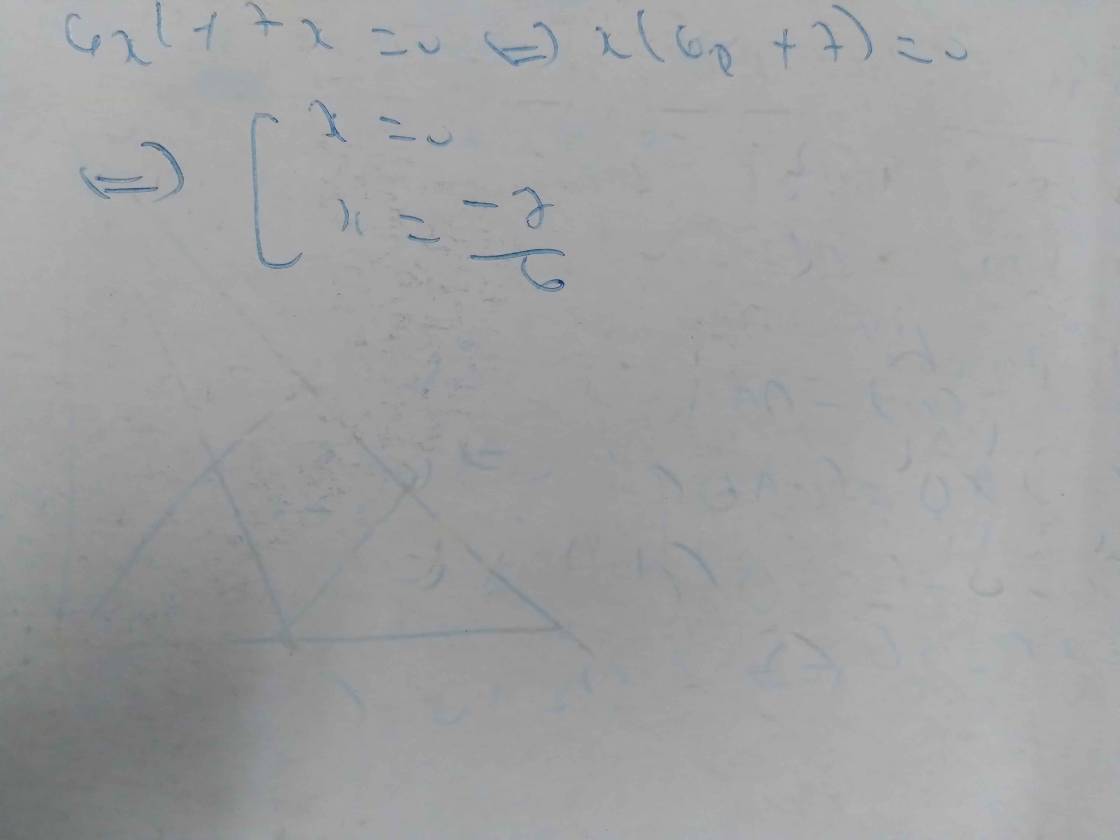
Hãy nhập câu hỏi của bạn vào đây, nếu là tài khoản VIP, bạn sẽ được ưu tiên trả lời.


2x^2 + 7x - 9 = 0
2x^2 - 2x + 9x - 9 = 0
2x ( x - 1 ) + 9 ( x - 1 ) = 0
( x - 1 ) ( 2x + 9 ) = 0
x -1 = 0 hoặc 2x + 9 = 0
x = 0 + 1 hoặc 2x = 0 - 9
x = 1 hoặc 2x = - 9
x = 1 hoặc x = -9 : 2
x = 1 hoặc x = -9/2
x = 1 hoặc x = -4,5
Ta có: \(2x^2+7x-9=0\)
\(\Rightarrow2x^2-2x+9x-9=0\)
\(\Rightarrow2x\left(x-1\right)+9\left(x-1\right)=0\)
\(\Rightarrow\left(2x+9\right)\left(x-1\right)=0\)
\(\Rightarrow2x+9=0\)hoặc \(x-1=0\)
\(\Rightarrow x=-\frac{9}{2}\)hoặc \(x=1\)
k vs kb với tớ nhé mn!

Đặt f(x) = 2x2 + 7x - 9
f(x) = 0 <=> 2x2 + 7x - 9 = 0
<=> ( x - 1 )( 2x + 9 ) = 0
<=> x - 1 = 0 hoặc 2x + 9 = 0
<=> x = 1 hoặc x = -9/2
Vậy nghiệm của đa thức là 1 và -9/2

Ta có:
\(4x^2+\dfrac{2}{5}x\)
\(=x\left(4x+\dfrac{2}{5}\right)\)
Do đó để đa thức \(4x^2+\dfrac{2}{5}x\) có nghiệm thì \(x\left(4x+\dfrac{2}{5}\right)=0\)
\(\Rightarrow\left[{}\begin{matrix}x=0\\4x+\dfrac{2}{5}=0\end{matrix}\right.\)
\(\Rightarrow\left[{}\begin{matrix}x=0\\4x=-\dfrac{2}{5}\end{matrix}\right.\)
\(\Rightarrow\left[{}\begin{matrix}x=0\\x=-\dfrac{1}{10}\end{matrix}\right.\)
Vậy nghiệm của đa thức là \(x\in\left\{0;-\dfrac{1}{10}\right\}\)



a) \(f\left(x\right)=x^2+7x-8=0\)
\(\Leftrightarrow f\left(x\right)=x^2-x+8x-8=0\)
\(\Leftrightarrow f\left(x\right)=\left(x^2-x\right)+\left(8x-8\right)=0\)
\(\Leftrightarrow f\left(x\right)=x\left(x-1\right)+8\left(x-1\right)=0\)
\(\Leftrightarrow f\left(x\right)=\left(x-1\right)\left(x+8\right)=0\)
\(\Rightarrow x-1=0\) hoặc \(x+8=0\)
Nếu \(x-1=0\Rightarrow x=1\)
Nếu \(x+8=0\Rightarrow x=-8\)
Vậy đa thức f(x) có nghiệm là 1 và -8
b) \(k\left(x\right)=5x^2+9x+4=0\)
\(\Leftrightarrow k\left(x\right)=5x^2+5x+4x+4=0\)
\(\Leftrightarrow k\left(x\right)=\left(5x^2+5x\right)+\left(4x+4\right)=0\)
\(\Leftrightarrow k\left(x\right)=5x\left(x+1\right)+4\left(x+1\right)=0\)
\(\Leftrightarrow k\left(x\right)=\left(x+1\right)\left(5x+4\right)=0\)
\(\Rightarrow x+1=0\) hoặc \(5x+4=0\)
Nếu \(x+1=0\Rightarrow x=-1\)
Nếu \(5x+4=0\Rightarrow x=-\frac{4}{5}\)
Vậy đa thức k(x) có nghiệm là -1 và -4/5

Đặt `6x^2+7x=0`
`-> 6x*x+7x=0`
`-> x(6x+7)=0`
`->`\(\left[{}\begin{matrix}x=0\\6x+7=0\end{matrix}\right.\)
`->`\(\left[{}\begin{matrix}x=0\\6x=0-7\end{matrix}\right.\)
`->`\(\left[{}\begin{matrix}x=0\\6x=-7\end{matrix}\right.\)
`->`\(\left[{}\begin{matrix}x=0\\x=-\dfrac{7}{6}\end{matrix}\right.\)
Vậy, nghiệm của đa thức là `x=0, x=-7/6`.
`@`\(\text{dn inactive.}\)

Đặt \(x^2-7x+8=0\)
\(\Delta=\left(-7\right)^2-4\cdot1\cdot8=17>0\)
Do đó: Phương trình có hai nghiệm phân biệt là:
\(\left\{{}\begin{matrix}x_1=\dfrac{7-\sqrt{17}}{2}\\x_2=\dfrac{7+\sqrt{17}}{2}\end{matrix}\right.\)

Ta có:
2x^2+7x-9=0
<=>2x^2-2x+9x-9=0
<=>2x(x-1)+9(x-1)=0
<=>(x-1)(2x+9)=0
<=>x-1=0 hoặc 2x+9=0
+)x-1=0<=>x=1
+)2x+9=0<=>2x=-9<=>x=-9/2
Học tốt